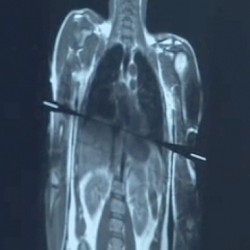By Helen Figueira
September 10, 2010
Time to read: 2 minutes
 Tony Goldstone in BBC’s ‘Health Explained’
Tony Goldstone in BBC’s ‘Health Explained’
The Molecular and Metabolic Imaging Group’s Tony Goldstone has recently given a number of high profile talks on the physiological role of fat and hormonal control of eating behaviour.
In June, he gave a talk at The Endocrine Society meeting in San Diego, USA on ghrelin, a stomach hormone that seems to influence eating behaviour through stimulation of the brain’s dopaminergic reward system – the same network of neurons that are involved in addictive behaviours. Ghrelin levels rise when we fast, making us feel hungrier. In his talk, Tony discussed how volunteers given ghrelin report an increased preference for higher calorie foods over healthier options. They also showed greater activation in the orbitofrontal cortex, a part of the brain involved in encoding reward value, when looking at high-calorie but not low-calorie foods – the same effect observed in volunteers who had fasted. This may explain why those who skip breakfast find higher calorie foods more appetising by lunchtime. The research also suggests the possibility of using drugs that suppress or block ghrelin to reduce cravings for high calorie foods and help people lose weight.
The talk was highlighted by a number of publications, here, here and here.
Tony also gave some talks to the public as part of Guerilla Science, an organisation that promotes public understanding of science in non-traditional settings, in order to reach audiences that may not otherwise have any contact with scientists. On July 4th, Tony gave a talk at the ‘Flavour Feast’ event at Borough Market, London, followed by an appearance at ‘The Secret Garden Party’ festival in Cambridgeshire on the 24th and 25th of July.
Most recently, Tony presented a video as part of BBC News’ Health Explained, entitled What is Fat? You can see the video here.